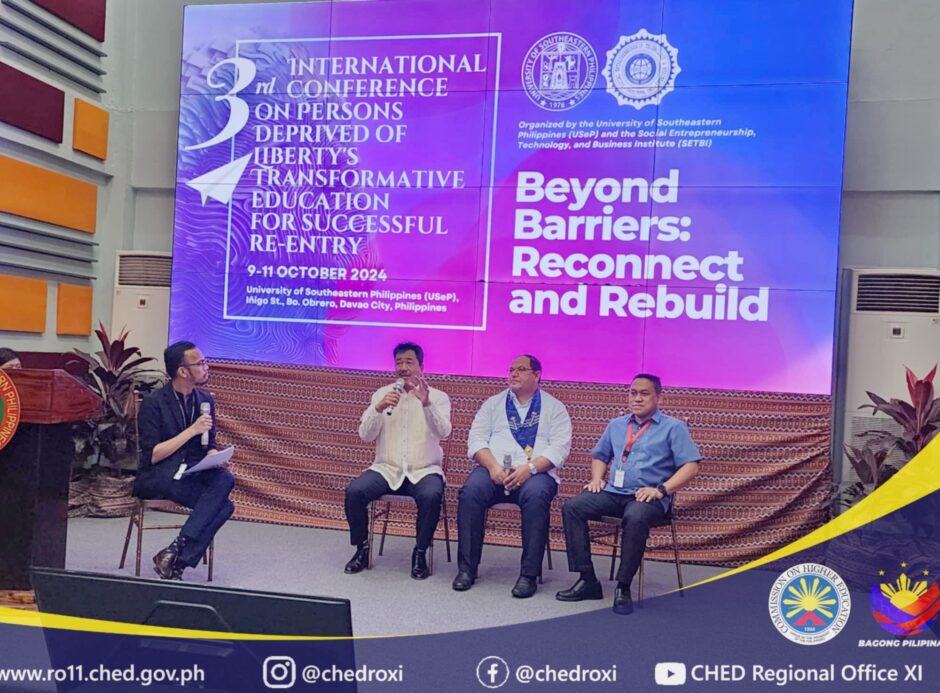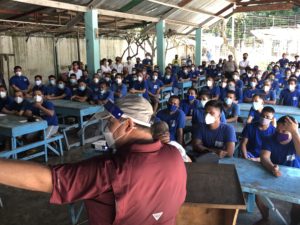
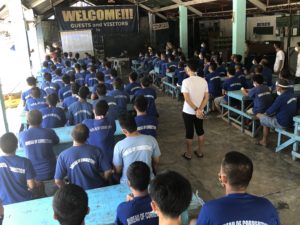
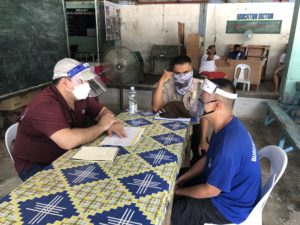
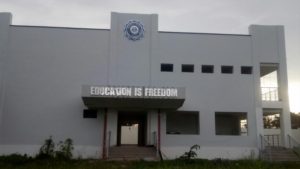
 (August 2020) Schools across the Philippines have encountered challenges during the statewide lockdown. Those same challenges were also faced by College Education Behind Bars inside the Davao City Jail and the Davao Prison and Penal Farm because COVID-19 safety measures stopped face-to-face educational services. However, College Behind Bars educators turned to communication, cooperation, and innovation to achieve rehabilitative education goals. With limited technology in the facility, we moved to paper correspondence amid the pandemic. No essentials were suspended altogether, such as physical education among the other programs.The benefits of College Education Behind Bars are well documented. Studies show that postsecondary programs can reduce recidivism while improving morale and safety in facilities and increasing post-incarceration job prospects. In the past jails and prisons have been warehouses with their limited space and minimal disinfectants allowing diseases to spread widely in facilities with insufficient health care and a high prevalence of underlying conditions. Because the Davao Prison and Penal Farm superintendent devised and implemented hygienic and safety measures, these ill effects mitigated the spread of diseases, so that the facility was COVID-19 free.
(August 2020) Schools across the Philippines have encountered challenges during the statewide lockdown. Those same challenges were also faced by College Education Behind Bars inside the Davao City Jail and the Davao Prison and Penal Farm because COVID-19 safety measures stopped face-to-face educational services. However, College Behind Bars educators turned to communication, cooperation, and innovation to achieve rehabilitative education goals. With limited technology in the facility, we moved to paper correspondence amid the pandemic. No essentials were suspended altogether, such as physical education among the other programs.The benefits of College Education Behind Bars are well documented. Studies show that postsecondary programs can reduce recidivism while improving morale and safety in facilities and increasing post-incarceration job prospects. In the past jails and prisons have been warehouses with their limited space and minimal disinfectants allowing diseases to spread widely in facilities with insufficient health care and a high prevalence of underlying conditions. Because the Davao Prison and Penal Farm superintendent devised and implemented hygienic and safety measures, these ill effects mitigated the spread of diseases, so that the facility was COVID-19 free.
The College Education Behind Bars, initiated in the Davao City Jail, has recently expanded into the Davao Prison and Penal Farm. Since Persons Deprived of Liberty (PDL) students are confined inside the prison, we built an exemplar college campus inside the Davao Prison and Penal Farm in conjunction with governmental agencies. At DaPeCol this will be first time that we will offer college and senior high classes. Students who study at DaPeCol’s College Education Behind Bars will enroll in the Davao Del Norte State College, and when they graduate, they will get their diploma from DNSC. The teachers will travel to the new facility to teach but will follow the DNSC curriculum repeating the model at the Davao City Jail, where the students in the College Education Behind Bars enroll in the University of the Southeastern Philippines courses and will graduate from USEP.
The College Education Behind Bars in both facilities has now, for the most part, gone one of two paths. In the Davao City Jail, we switched to a paper correspondence model while inside the Davao Prison and Penal Farm, we have designed a blended model, trying to leverage limited internet access on existing laptops and tablets that are not connected to the internet but can sync to a learning management systems technology and paper correspondence. The paper correspondence model involves packets of coursework dropped off at the jail and then picked up for grading. College Education Behind Bars at the DaPeCol campus will have controlled internet. But for many reasons education technology is very limited in prisons. The overriding concern for the jail or prison is always security, both security for their staff and for PDL in their custody, because hardware could be taken apart and weaponized or PDL could use the internet to plan crimes, communicate with victims of crime, or access other contraband. However, being able to use technology is key for successful re-entry into society and also for academic achievement. There is a strong case to be made for the nature of digital literacy in successful re-entry and PDL’s ability to get jobs after prison. Technology may be even more important for those serving long sentences.
Clearly, the best rehabilitation is face-to-face education because meeting role models, being treated with dignity, and forming a community are a major part of what make college education inside the prison such a unique and meaningful not only educational but also transformative experience in prisons. Perhaps the education itself is a rehabilitation, since faculty coming into prison purposefully offer the teacher to student interactions, assignments for improving PDL learning but also self-esteem, and classroom discussions that bring human connections to the students. As a result, instructors and college facilitators are thinking creatively of ways to maintain this dynamic in their absence. The bottomline is that the distance learning or paper model learning will not replace face-to-face learning but offers an effective intermediary.
Persons Deprived of Liberty (PDL) essentially share every aspect of their lives with others, on the first level with instructors who are embedding into their curricula opportunities to engage students with their classmates on materials and assignments. For our students, coming to class proves the highlight of their week because they get to engage and interact. Having face-to-face education changes not only the students, but also the prison culture. College classes keep students busy and away from prison politics and negativity, requiring positive use of their time inside the walls. Taking classes has given them a sense of accomplishment that makes them feel like their time behind bars is not being wasted. As they anticipate life after prison, they will have more career choices with the college education. It is important especially for those students who do not have connections and money. College Education Behind Bars prepares them and gives them guidance and advice. There is such a value to in person classes because it replicated an on campus experience; people are treated as students; they interact with a variety of people not accessible to them in their past, and they are treated as students, not criminals. PDL students who have often been marginalized and lacked access to good or even standard education throughout their lives deserve a high quality learning, just as marginalized students outside prison do by virtue of the worth of each human life.
During the lockdown the Davao City Jail Warden, JCInsp, Ian Gienn V. Ocmen, Matre used the College Education Behind Bars campus to prevent COVID inside the jail, because he did not allow any BJMP personnel to go and come to the facilities to avoid bringing the virus inside. The plan has been so far successful. We are honored that during the lockdown, the College Education Behind Bars building was appropriated for a worthwhile purpose. These are unprecedented times. Each and every one of us has been impacted in different ways during the development of policies surrounding the response to COVID-19. Attending to the needs of others remains paramount as we as a community navigate these new waters.
When we visited applicants to interview our first class inside the Davao Prison and Penal Farm, we maintained social distancing rules while wearing mask and gloves for the safety of all parties and proceeded with the interviews to avoid losing momentum on the new initiative. Students are eager as they work toward their rehabilitative goals. We have already interviewed new freshmen year students for the school years 2020-2021, senior high students, and 70 new students for the college. In total we have interviewed more than 100 students for the senior high and four-year college degree program.
I am inspired by the leadership of Davao Prison and Penal Farm Superintendent Gerardo Padilla and Davao City Jail Warden Ocmen, Matre. As I have witnessed, when called upon, DaPeCol Superintendent Padilla and the Davao City Jail Warden Ocmen, Matre have immediately stepped up for this challenging time, helped us to interview new students via zoom, and also allowed us to conduct one on one interviews in order to ensure PDL will also continue their education inside. I am very thankful for the exceptional adaptability of the President of the Davao Del Norte State College, Dr. Joy M. Sorrosa, and of the President of the University of the Southeastern Philippines, Dr. Lourdes C. General, because their level of collaboration has been impressive and their desire for the continuity of the learning remarkable.In addition, I am very grateful to all of our partners at the jail and prison facilities as well as at the universities, to the Vice President of the Social Entrepreneurship Technology and Business Institute, Attorney Susan Cariaga, and to teachers and staff—all who have dedicated and invested their time to continue to provide education to the students at the College Behind Bars.
Dr. Aland Mizell is with the MCI, SETBI and a regular Mindanao Times.You may email the author at:aland_mizell2@hotmail.com
